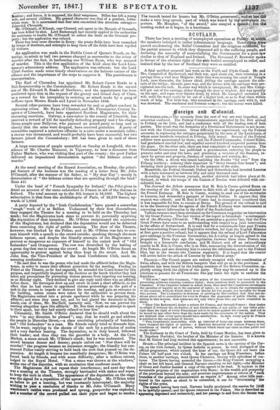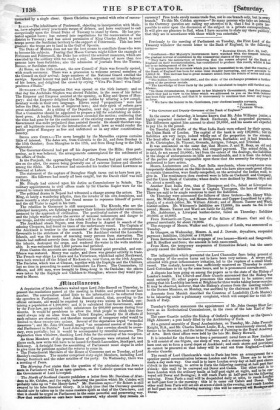_foreign anb SWITZERLAND.—The accounts from the seat of war are
very imperfect, and somewhat confused. The Federal Commissioners appointed by the Diet arrived in Friburg on the 15th, and had a conference with all the leading men of both parties. The result was the formation of a Provisional Government to act in con- cert with the Commissioners. Great difficulty was experienced, say the Federal accounts, in repressing the outrages perpetrated by the men of the Landsturm,of whom some hundreds remained in Fnburg, fully armed. Several of the Federal soldiers were assaseinated by them; and the Federal Commander, Colonel Billet, had proclaimed martial law, and expelled several hundred suspected persons from the place. On the other side, there are loud complaints of wanton tyranny. The Provisional Government has published a proclamation exhorting the people to preserve order and obey the laws; and promising a revision of the Seances, re- spect for person and property, freedom of conscience and worship, &c.
On the 19th, a decree was issued banishing the Jesuits "for ever" from the Friburg territory; ordering their departure in " thrice twenty-four hears"; and declaring their property confiscated to the purposes of the state. Meanwhile, the Federal Generals Dufour and Ochaenbein had invested Lucerne with a force estimated at between fifty and sixty thousand men. According to the German journals, another skirmish had taken place at St. Gothard, in which the troops of the Canton of Tessino were defeated with con- siderable lose.
The Journal des Debate announces that IL Bois le Comte quitted Berne on the evening of the 17th, and withdrew to Bile with all the persons attached to the French Embassy. M. Bois le Comte, wishing to send one of his secretaries to Lucerne, had demanded a passport of General Dufour. It appears that this request was refused; and IL Buis is Comte had in consequence considered that it was impossible for him to remain at Berne. The ground of the refusal is said to be the discovery that the agents of the French Embassy were instrumental in conveying secret information to the chief of the Sonderbund. Various rumours have been circulated on the Continent respecting- an intervention by the Great Powers. The last version of the report is furnishedi • a correspond- ent of the Morning Chronicle. "We are assured as a poeitivefact, that the Flys Great Powers have come to an understanding with respect to a joint intervention in the affairs of Switzerland. It is said that for a considen.ble time past Primate had been soliciting France and England to interfere, but that the English Minister at first gave a positive refusal; but it appears that the refusal of Lord Palmerston gave umbrage to the Prussian Government; his Lnidship at length agreed to the proposition. Three days ago the negotiation between these three Powers was brought to a favourable conclusion; and M. Guizot sent off an extraordinary courier to M. Bois le Comte, who is at Bile, announcing the determination of the Five Powers; and also directing him to convey the information, not to the Federal Diet, but to the twenty-two Cantons separately. • It is hoped that the courier will arrive before the attack of Lucerne by the Federal army."
FRANCE.—The French papers are entirely occupied with the consideration of Swiss affairs, and with the Reform banquets that still go on in the provinces. A manifesto has been issued by the leading members of the Reform Committee, ex- plicitly setting forth the obj_ects of the party. They may be summed up in the intention to procure for all Frenchmen who pay taxes the right to exercise the franchise.
Tm now," says this document, " the action of the Committee has been limited to presenting petitions claiming common rights : these petitions shall be presented to the Chamber. If the Chamber refuses to admit them, then shall the Committee investigate the question of legality as to the payment of taxes ; so as to obtain the representation of the country, without which there is no liberty for the people, nor morality for those who govern. The Committee Is desirous of proving by this conduct that they are de- sirous above all to consolidate for ever In France the guarantee of public liberty, con- sisting in this maxim, that taxes are due only when those who pay have consented to them.
" They [the Reformers] desire a reform for France, and through France: they desire to obtain it without the mediation of any dictatorship, of any party, of any other prin- ciple than the right of every Frenchman not to be taxed against his consent, and not to be bound by any other force than the laws made by the concourse of the nation. They are desirous that every partyshould have satisfaction. In fact, every party in France
is entitled to the enjoyment of liberty. • • •
" Two Constituent Assemblies, with an interval of forty-one years between them, have violated the rights of nations : a National Assembly will restore France to her conditions of liberty and of power, without which there can exist neither public nor moral order."
The Embassy to the Court of Turin, held by Count Mortier, has been given to M. Napoleon Duchitel, the brother of the Minister of the Interior. It is known that IL Guizot had long resisted this appointment; he now succumbs.
SruN.—The principal incident in the Spanish news is the opening of the Cor- tes, on the 15th Instant, by Queen Isabella in person. In total disregard of the official programme, which named the hoar of one, the Queen did not leave the Palace till half-past two o'clock. In her carriage sat King Francisco; before them, in another carriage, went Queen Christina, blazing with splendour of cos- tume. The Queen having ascended the throne,—the King Consort occupying a chair on her left hand, and General Narvaez standing on her right,—the Minister of Grace and Justice handed a copy of the speech to be read. It rejoices in the favourable progress of the negotiations with Rome; in the wealth and prospegruil of the provinces beyond the seas; and promises improvements or reform of " branches of the general administration as require it." Among other bills men- tioned in the speech as about to be submitted, is one for "determining" the rights of the press. The speech having been read, Nunez loudly proclaimed the session for 1848 to be lawfully opened; and the Queen returned to the Palace. She is described as appearing depressed and melancholy, and her passage to and from the Senate was
unmarked by a single cheer. Queen Christina was greeted with cries of execra- tion.
tram—The inhabitants of Pontremoll, objecting to incorporation with Mode- na, have adopted every practicable means of defence, and have continued to call energetically upon the Grand Duke of Tuscany to stand by them. He has pro.. tested against haste; has entered into negotiations for the reannexation of the district to Tuscany; and has asked permission of King Charles Albert to send troops across the Sardinian territory to the support of Pontremoli. This has been granted: the troops are to land in the Gulf of Spezzia. The Duke of Modena does not use the best means to conciliate those who were to become his subjects. Fearing that Massa Carrara might follow the example of Fivizzano and Pontremoli, the Duke has ordered the severest measures, which are executed by the soldiery with too ready a zeal. Assemblages of more than two =have been forbidden; also the admission of journals from the Tuscan, or Sardinian states. At Rome, on the 15th instant, the new Council of State was formally opened, with much ceremony. There was a procession to welcome several members of the Council on their arrival; large numbers of the National Guard swelled the cortege. Special honour was paid to Lord Minto; who came out into the balcony of his house, and delighted the crowd by crying "Viva Pio None ! viva l'indi- pendenza d'Italia."
MINGARY.—The Hungarian Diet was opened on the 15th instant; and on that day the Archduke Stephen was elected Palatine, in the room of his father. The Emperor and Empress assisted at the opening, as King and Queen of Hun- gary; and the Emperor delighted the Magyar nobles by uttering a few compli- mentary words in their own language. Eleven royal "propositions " were laid before the Diet, as the basis of Improved laws; and their spirit of reform gave great satisfaction. At a sitting of the Deputies, next day, a member proposed that a Committee should be appointed to prepare a bill for establishing an unfet- tered press. A leading Ministerial member seconded he motion; confessing that the time had gone by for the continuance of the existing censor system, and that Government was more prejudiced than assisted thereby. He should therefore sup- port all legitimate means for the introduction of such laws as would render the public press of Hungary as free and unfettered as in any other constitutional country.
Tanta AND Cita/A.—The news brought by the Marseilles express contains little of interest. The dates are, from Calcutta to the 3d, and from Bombay to the 15th October; from Shanghae to the 12th, and from Hong-kong to the 29th September. The Governor-General had put off his departure from the Hills; thus post- poning, as it was believed, the arrangements contemplated for the settlement of the affairs of Oude.
In the Punjaub, the approaching festival of the Dussera had put our authori- ties on the alert, the season being generally one of extreme licence and disorder among the Sikhs. Mr. Lawrence had succeeded his brother Colonel Lawrence as Resident at Lahore.
The statement of the capture of Doonghur Singh turns out to have been pre mature. His followers had nearly all been caught, but the Dacoit chief was still at liberty. Mr. Pringle had entered upon his duties as Commissioner in Scinde. The military appointments to civil offices made by Sir Charles Napier were for the present to remain unchanged. The political drama in Nepaul had witnessed a change among the actors. The King, so lately a wandering pilgrim, then the invader of his own dominions, and more recently a state prisoner, has found means to repossess himself of power; and the old Vizier is caged in his turn. The rebellion in Goomsoor is still unrepressed. The %bonds, who are the principal insurgents, are fighting to preserve their hideous infanticidal ceremonies, menaced by the approach of civilization. The pestilential nature of the climate and the jungle warfare render the service of unusual tediousness and danger to our troops, and the subjugation of the rebels will be the work of time.
The Auckland steam frigate, sent from Bombay in August in search of the missing Cleopatra, had found no trace of the unfortunate vessel. The Captain of the Auckland is brother to the commander of the Cleopatra; a circumstance favourable to the strictness of the search. The Auckland visited the Laccadive Islands, and was the means of rescuing many persons from starvation. The islands had suffered severely from the hurricane: the sea had overflowed two of the islands, destroyed the crops, and rendered the water in the wells undrink- able. It was estimated that 1,800 persons had perished.
From Canton the accounts are satisfactory. General quiet prevailed, and con- fidence was restored. Money was easier, and there was greater activity in trade. The French war-ships La Gloire and La Victorieuse, which had sailed Northward, were both wrecked off the Island of Ko-koou-to, near Corea, on the 10th August. The Daedalus, which was at Chusan, together with the Espiegle and the Childers, lost no time in proceeding to assist Commodore La Pierre. The Commodore, 12 officers, and 296 men, were brought to Hong-kong in the Dwdalus; the others were taken by the Espiegle and Childers to Shanghae; whence they would pro- ceed to Macao.



























 Previous page
Previous page